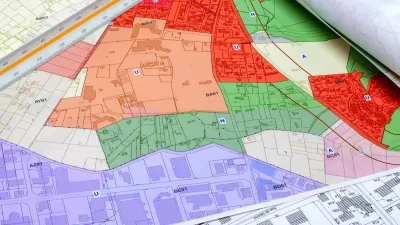New research analyzing carbon emissions throughout the life cycle of buildings shows that high-rises create more carbon emissions than dense, low-rise developments.

Researchers Ruth Saint and Francesco Pomponi shares news of their new study asserting that dense, low-rise buildings are better for the environment than high-rises. Despite their ability to drastically increase density in urban areas, high-rise buildings, according to the study, create more carbon emissions down the line. This is largely due to what Saint calls "embodied" carbon emissions, "all the hidden, behind-the-scenes carbon produced during the extraction, production, transport and manufacture of raw materials used to construct a building, plus any produced during maintenance, refurbishment, demolition or replacement." This overlooked aspect of a development's overall carbon footprint, experts argue, must be emphasized in order to reduce emissions in cities.
Our findings show that high-density low-rise cities, such as Paris, are more environmentally friendly than high-density high-rise cities, such as New York. Looking at the fixed population scenarios, when moving from a high-density low-rise to a high-density high-rise urban environment, the average increase in whole life-cycle carbon emissions is 142%.
With countries targeting aggressive emissions reduction goals, Saint argues that urban planners and developers must use this knowledge to advance more sustainable building practices that reduce the carbon footprint of cities while continuing to accommodate growing urban populations.
FULL STORY: Cities and climate change: why low-rise buildings are the future – not skyscrapers

Alabama: Trump Terminates Settlements for Black Communities Harmed By Raw Sewage
Trump deemed the landmark civil rights agreement “illegal DEI and environmental justice policy.”

Study: Maui’s Plan to Convert Vacation Rentals to Long-Term Housing Could Cause Nearly $1 Billion Economic Loss
The plan would reduce visitor accommodation by 25% resulting in 1,900 jobs lost.

Planetizen Federal Action Tracker
A weekly monitor of how Trump’s orders and actions are impacting planners and planning in America.

Federal Homelessness Agency Places Entire Staff on Leave
The U.S. Interagency Council on Homelessness is the only federal agency dedicated to preventing and ending homelessness.

Restoring Northern India’s Himalayan ‘Water Temples’
Thousands of centuries-old buildings protect the region’s natural springs and serve as community wells and gathering places.

Milwaukee to Double Bike Share Stations
Bublr Bikes, one of the nation’s most successful, will add 500 new e-bikes to its system.
Urban Design for Planners 1: Software Tools
This six-course series explores essential urban design concepts using open source software and equips planners with the tools they need to participate fully in the urban design process.
Planning for Universal Design
Learn the tools for implementing Universal Design in planning regulations.
Caltrans
Smith Gee Studio
Institute for Housing and Urban Development Studies (IHS)
City of Grandview
Harvard GSD Executive Education
Toledo-Lucas County Plan Commissions
Salt Lake City
NYU Wagner Graduate School of Public Service





























